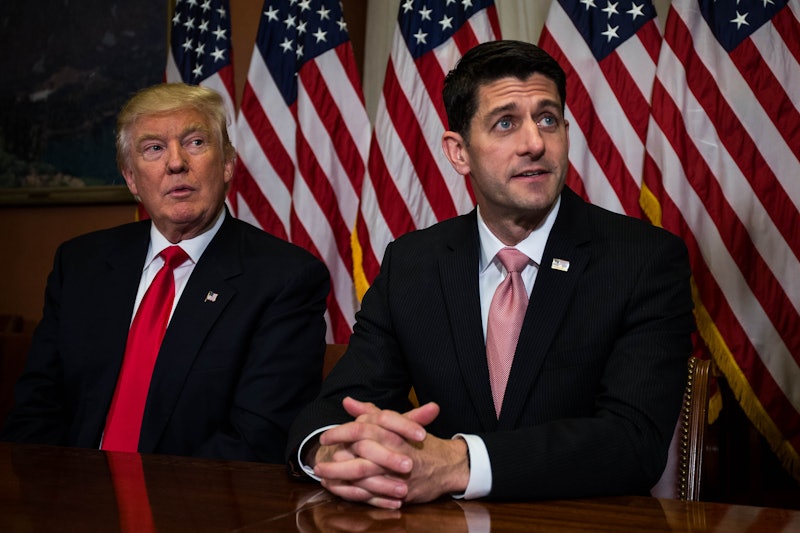News
Could Paul Ryan Primary Trump In 2020?
Are the words "President-elect Donald Trump" getting any more normal-sounding yet? Maybe they shouldn't, considering the danger of normalizing the incendiary, fear-and-rage soaked campaign he just ran. But the fact remains, he got those essential 270 electoral votes, despite losing the popular vote by a wide margin. So, if anyone's thinking about an electoral challenge, it's got to be four years from now. But could a challenge come from within Trump's own party? Could Paul Ryan run for president in 2020, and deliver a blow to the man who's successfully seized the reins of the GOP?
Sadly, if you're hoping for a somewhat more conventional Republican to make a play at dethroning Trump, history suggests Ryan isn't likely to be it ― and indeed, nobody is. It's fleetingly rare for an incumbent president to receive a primary challenge, and it hasn't happened in 36 years, since President Jimmy Carter weathered a challenge from Democratic senator Ted Kennedy.
The reason it's so uncommon is obvious: barring unusual circumstances, political parties are usually happier keeping an incumbent president safely in place and unchallenged, rather than engaging in a protracted, potentially damaging internal skirmish just months before a general election. In 1980, Carter survived his primary challenge, but ultimately succumbed to Ronald Reagan in one of the most pivotal elections of the late 20th century.
It's also true that Ryan is in uniquely poor position to mount such a challenge, because he's just wrapped up an exhausting, awkward, often at-arm's-length endorsement of Trump's candidacy. In other words, he's now irreversibly linked to Trumpism, and if Trumpism is still electorally viable in 2020, it's hard to imagine why a radicalized GOP base would pick Ryan rather than the man himself.
He holds a job right now, as well, which has a decidedly less-than-stellar track record of launching people to the presidency. Being Speaker of the House necessarily embroils someone in all the controversies, conflicts, and potentially alienating decisions of a major party's congressional caucus, and as such, it can sap away personal popularity and public approval. It's important to remember that even while American citizens often have positive opinions of their own, individual congressional representatives, the institution on as a whole is viewed abysmally. As of September 2016, a mere 20 percent of Americans approved of the U.S. Congress, according to a Gallup tracking poll.
For some perspective, the last time a former Speaker of the House mounted a successful bid for the presidency was all the way back in 1844, when James K. Polk defeated Henry Clay to become the 11th president of the United States. In other words, not exactly a well-represented career trajectory. In short, if Trump is still president when 2020 rolls around, barring some kind of presently unforeseen circumstance ― like an impeachment, or a resignation, or an absolute mass mutiny against him ― he's going to be the nominee, and the GOP isn't going to risk their control of the White House to challenge him.
